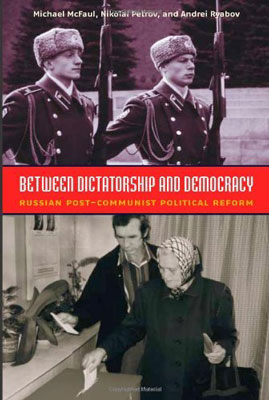Source: Washington
 For hundreds of years, dictators have ruled Russia. Do they still? In the late 1980s, Soviet President Mikhail Gorbachev launched a series of political reforms that eventually allowed for competitive elections, the emergence of an independent press, the formation of political parties, and the sprouting of civil society. After the collapse of the Soviet Union in 1991, these proto-democratic institutions endured in an independent Russia.
For hundreds of years, dictators have ruled Russia. Do they still? In the late 1980s, Soviet President Mikhail Gorbachev launched a series of political reforms that eventually allowed for competitive elections, the emergence of an independent press, the formation of political parties, and the sprouting of civil society. After the collapse of the Soviet Union in 1991, these proto-democratic institutions endured in an independent Russia.
But did the processes unleashed by Gorbachev and continued under Russian President Boris Yeltsin lead eventually to liberal democracy in Russia? If not, what kind of political regime did take hold in post-Soviet Russia? And how has Vladimir Putin's rise to power influenced the course of democratic consolidation or the lack thereof? Between Dictatorship and Democracy seeks to give a comprehensive answer to these fundamental questions about the nature of Russian politics.
This book reflects the unique collaboration of Russian and American scholars. Additional contributors include: Viktor Sheinis, Mikhail Krasnov, Vladimir Petukhov, and Elina Treyger.
About the Authors
Michael McFaul is a former senior associate in the Russian and Eurasian Program at the Carnegie Endowment and associate professor of political science at the Hoover Institution, Stanford University. He is the author of Russia's Unfinished Revolution: Political Change from Gorbachev to Putin.
Nikolai Petrov and Andrei Ryabov are co-chairs of the Russian Domestic Politics and Political Institutions Program at the Carnegie Moscow Center.
Advance Praise
"Well informed and judicious."
—The New York Times
"There are simply no better scholars of Russian democracy writing today than Michael McFaul, Nikolai Petrov, and Andrei Ryabov. Did the poet say you can't understand Russia by reason alone? Their cool and rigorous analyses will convince you otherwise."
—Stephen Sestanovich, Council on Foreign Relations and former Ambassador at Large for the New Independent States
"Michael McFaul, Nikolai Petrov, Andrei Raybov and their collaborators have written a thoroughly comprehensive book on one of the most important questions facing Russia today. The future of Russia's democracy may be the last lingering question from the revolutionary process launched almost two decades ago. To understand why Russia's political transition has been so long and protracted, there is no better place to start than "Between Dictatorship and Democracy."
—Yegor Gaidar, Director of the Institute for the Economy in Transition and former Prime Minister of Russia, 1991-92
"This volume presents a comprehensive, rich, and insightful overview of the major trends in Russian democratization since the Gorbachev era. The coverage of nearly every conceivable institutional theme related to the democratization process…makes the collection particularly valuable for students of Russian politics and society. The fact that the authors are among the best-known Western and Russian experts on the subject…will surely guarantee the book a wide audience, both among academic specialists and students at the advanced undergraduate and graduate levels."
—Stephen Hanson, University of Washington
"Many thought a decade ago that Russia had irreversibly crossed the boundary separating dictatorship from democracy. We now see discouraging evidence of an authoritarian revival that places Russia back in the gray zone between regimes. This collection of empirically rich and theoretically informed essays by Russian and American specialists shows why the backsliding has occurred, with what results, and with what implications for the future."
—Timothy J. Colton, Director of Davis Center for Russian and Eurasian Studies, Harvard University

.jpg)



.jpg)